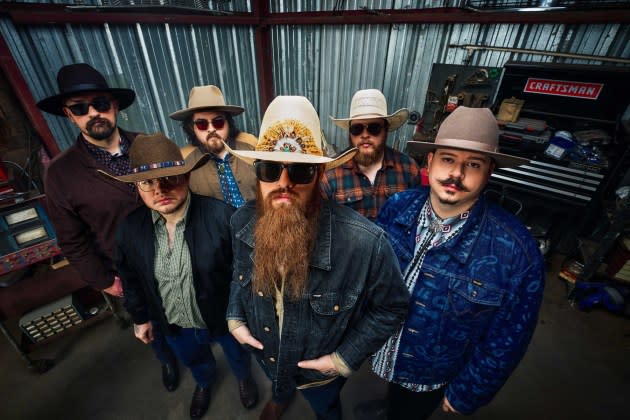49 Winchester Are Headlining a Fall U.S. Tour But Still Can’t Escape the Holler

It’s not lost on Isaac Gibson how quickly his band 49 Winchester have rocketed from near obscurity into the Americana and country music spotlight and onto stages not just across the U.S., but around the world.
Leaning forward on the couch in the group’s tour bus, Gibson raises his head and peers out the windshield from behind his sunglasses to see which city he’s in on this particular day. As it turns out, it’s Atlanta, where 49 Winchester will be kicking off a three-day run opening for Blackberry Smoke later that night at the Cadence Bank Amphitheatre.
More from Rolling Stone
49 Winchester Miss Loved Ones at Home in the New Song 'Yearnin' for You'
Luke Grimes, Molly Tuttle, and Those Insane Views Help Make 'Under the Big Sky' Country's Cool Fest
Soon, a rowdy crowd of thousands will be howling along with 49. With the sextet bulldozing through its set of catchy, towering alt-country melodies, Gibson’s vocal bravado echoes loudly through the venue and surrounding Chastain Park.
The singer-guitarist’s dynamic stage presence and scorch-the-earth throat squarely place the 30-year-old Gibson in the same rattle-and-rumble vocal ballpark as Tyler Childers and Luke Combs, both of whom 49 Winchester have recently opened for.
“Those two nights at Bridgestone [Arena] were incredible. That was a big one,” Gibson says of supporting Childers this past April in Nashville. “It’s something we worked really hard for and pretty tirelessly for a decade to get to where we are today. It wasn’t something that happened overnight.”
On Thursday, the group will launch their own headlining tour, kicking off in Raleigh, North Carolina, in support of 49’s latest album, Leavin’ This Holler. The record is not only doing well on streaming services, but is reigniting interest in the group’s previous albums, including their 2022 breakout, Fortune Favors the Bold. Gibson is happy to have the back catalog to chart the group’s journey.
“Ten years of this? We’re ready for it. Part of me is almost glad our success didn’t come earlier,” he says of the band’s decade together. “We’re just better equipped to handle some notoriety as 30-year-old men than when we were 20-year-old kids.”
Beyond the tear-in-your-beer, love lost/love found ballads and rebel-yell odes to chasing dreams, the core of Leavin’ This Holler lies in the juxtaposition between the group’s hardscrabble surroundings of Southern Appalachia and the more polished environs they’ve been encountering on the road.
“It’s this dichotomy that we like,” Gibson says. “All the glitz and glam of the city, the fun stuff we do on tour. Then, we go back and crawl into the mountains and see nobody, hear nobody.”
But no matter how far and wide they travel, 49 Winchester’s native geography will always inform their music and their message.
Named after the address of Gibson’s childhood home in Castlewood, Virginia (population: 2,045), 49 Winchester came about when Gibson and his childhood cronies — bassist Chase Chafin, guitarist Bus Shelton, and Noah Patrick on pedal steel — began jamming on the front porch. Not long after high school graduation, goals were set to someday “leave the holler” and make it in music.
“I’m leavin’ the way things used to be/I will not be returning/My spirit is still yearning/For a chance at being happy, Lord, and free,” Gibson sings in the title track to “Leavin’ This Holler,” with harmony vocals from Maggie Antone. It’s a promise that Gibson knows he didn’t keep.
“It’s been really difficult forging a music career as a band from Central Southern Appalachia,” Gibson says. “That [song] is a little snippet of what my life has been like, even though I didn’t leave the holler altogether.”
Gibson, Shelton, and Patrick still live in Castlewood (Chafin is right down the road in Johnson City, Tennessee). The close proximity of the lifelong friends isn’t by accident, nor is their decision to keep one foot in the soil where they were raised.
“We’re a band that derives a lot of our identity from the place they came from,” Gibson says. “We’ve always wanted to be a torchbearer for Appalachia and Appalachian music. It would’ve been inauthentic to have moved away, abandoned that place, and tried to portray it like that. We’ve never shied away or tried to run away.”
These days, 49 Winchester plays gigs for audiences often larger than all of the residents of Castlewood and greater Russell County combined: Last October, they opened for Combs in front of 20,000 at London’s O2 Arena.
“There’s not much anonymity anymore,” Gibson says of the occasions when he finds himself back in Castlewood. “And that’s okay, because it’s people I’ve known my whole life. They’re proud of me. I’m just that guy from town that went out and did a cool thing.”
Best of Rolling Stone